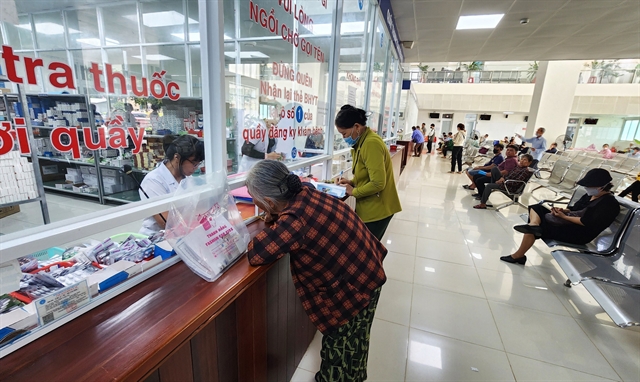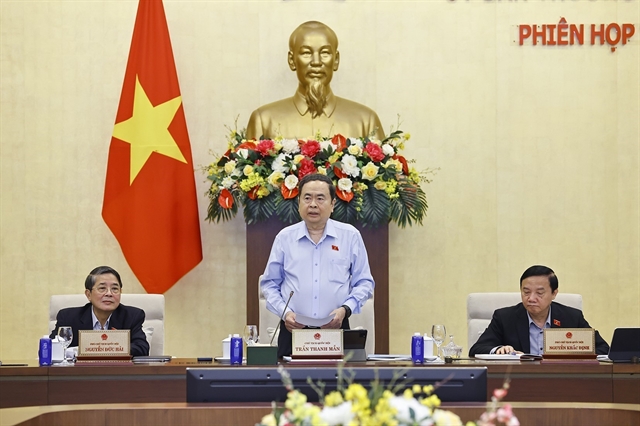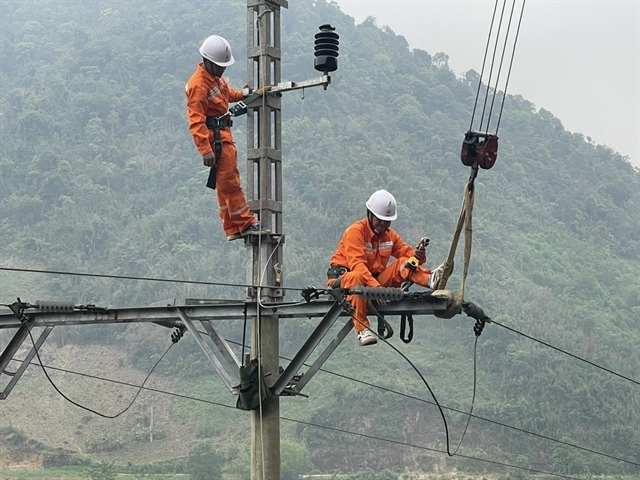 Opinion
Opinion


|
| Workers repair an electricity transmission line in Phù Yên, Sơn La Province. VNA/VNS Photo |
In a recent interview with the Tiền Phong (Vanguard) newspaper, Associate Professor Dr. Trần Đình Thiên, former Director of the Việt Nam Institute of Economics, highlighted the need to closely follow the market-based principles in deciding electricity prices, noting that encouraging low-priced electricity means promoting backward industrial development.
There is a shortage of electricity in the northern region while the southern region doesn't face the same issue. So does it mean that the South doesn't have surplus electricity to supply to the north, or is it due to the transmission system's inability to meet the demand?
In the south, there is some surplus electricity, but not a significant amount. The surplus is mainly due to existing power sources, but the licensing process for new power plants has been cumbersome so it’s been delayed, resulting in a considerable amount of resources wasted. However, because the second 500kV transmission line to the central Quảng Bình Province is out of service, the surplus electricity cannot be transmitted to the North.
The electricity shortage in the north is caused by two factors: inconsistent mechanisms and vision. It is also because of the unpredictability of extreme weather conditions such as intense heatwaves leading to the drying up of major hydropower plants, while many other power plants are still under construction.
Many power generation projects in the revised National Power Development Master Plan have not been implemented. Is that the main reason for the current electricity shortage?
In the north, there is not much sunlight and wind, leading to the more challenging conditions for renewable energy development, while the pricing mechanism does not support renewable energy development in the north.
Meanwhile, many traditional power projects have faced difficulties and cannot be further developed. Several localities are not willing to engage in (the development of traditional power projects) and oppose traditional ones, and the central government still accommodates their preferences. Here, it is evident that there are some obstacles to long-term national interests and national strategy due to local interests.
We need to consider whether the localities that oppose (the development of traditional power projects) guarantee national benefits. If we fall into populism and avoid taking action due to opposition, it will lead to significant losses for the country.
The approach should always be based on market principles, meaning that the risk of electricity scarcity is an investment opportunity. Thus, we must address it through a pricing mechanism that is coupled with conditions ensuring social and environmental aspects, following market principles to effectively resolve the issue.
There is also lack of professionalism, leading to confusion and indecisiveness, irresponsibility, and conflicting laws. That is why businesses have to bear the consequences. If we continue in this manner, and as time goes on, the system, especially those with power, will benefit from these delays. This is the time for us to recognise and address this issue.
You once said that no electricity means death, high electricity prices don't. Was it something you have foreseen and warned about the current electricity shortage?
The underlying principle is simple: when there is an electricity shortage, we need to encourage investment. To encourage investment, we must ensure the benefits for investors.
When the Government purchases electricity at high prices, it helps attract investors to invest in electricity. Accordingly, low electricity prices encourage high consumption, which, in turn, increases the likelihood of electricity shortages and environmental damage. The country will pay a long-term price for this.
It will cause a significant harm on a national scale as encouraging low-priced electricity means promoting backward industrial development. Investors with low technological capabilities see cheap electricity in Việt Nam as an opportunity to exploit it extensively. As a result, this hampers the technological development of Việt Nam's economy, leading to severe consequences.
Price is always the heart of the market, so we must use price mechanisms for management. Currently, our approach to electricity pricing has significant issues that have been pointed out for many years but have not changed, and the consequences are now evident. I hope that after this incident, there will be more significant changes in our approach to electricity pricing. Prices should be market-based to ensure a balance of interests.

|
| Residents in Đống Đa District gather outside after a power outage. VNA/VNS Photo Hoàng Hiếu |
Does that mean that our method of calculating electricity prices has not been accurate or adequately reflected the essence of the electricity market issue?
Every consumer prefers lower prices. However, if these lower prices are not calculated comprehensively, it can lead to long-term damage to our strategy to attract investment, as what we are currently witnessing. Many countries protect the poor, but not in the way that limits electricity prices as we do. They (these countries) clearly separate welfare issues from market issues, rather than combining them into a single electricity price, which disrupts the structure of a competitive market. Therefore, we need to change in that sense, not neglecting the interests of the poor in the electricity pricing issue.
What stage is the electricity market currently at?
The roadmap for building an electricity market has been set for decades, but progress has been slow. We have proposed testing market-based electricity pricing policies, but the Government and related ministries and sectors have been overly cautious, resulting in a slow pace.
This challenging period may create an impetus for us to handle the electricity market issue more strongly and in a more synchronised manner. I sincerely hope and believe that the actions of the Government can expedite the development of a complete competitive electricity market.
In the past, people believed that the electricity industry's inability to meet electricity demand was due to the monopoly factor. Do you agree?
The capability to meet the country's electricity demand has always been ensured. The current shortage is only in the north, and we cannot generalise this short-term issue to assume a bleak outlook for electricity supply. Việt Nam has abundant potential in terms of electricity sources, especially renewable energy. The problem lies in having a systematic approach to address it. We should not be overly pessimistic and should not take this opportunity to dismiss or deny the significant achievements we have made. — VNS




